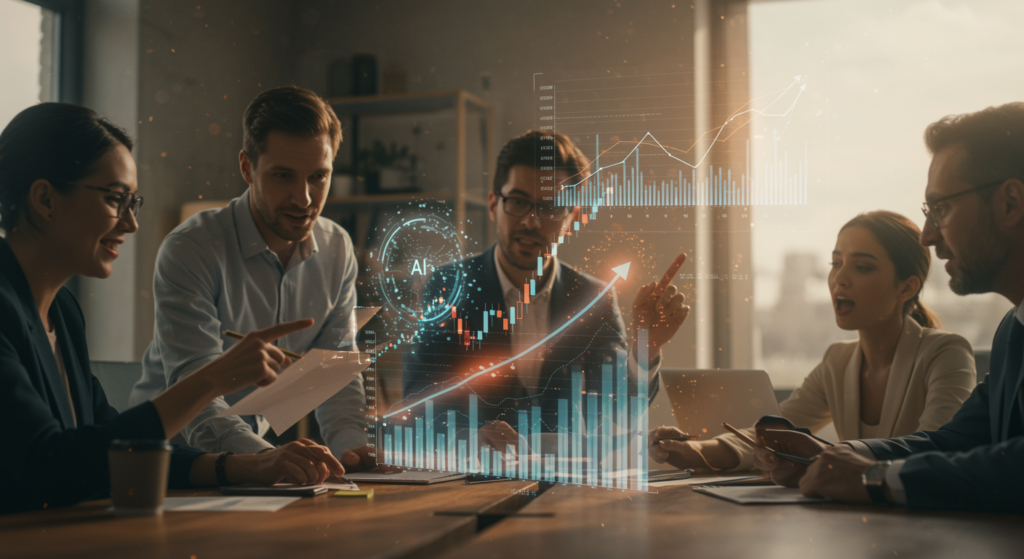
AI Economic Implications: Anthropic Forms Expert Council
Understanding Anthropic’s New Economic Advisory Council
Have you ever wondered how cutting-edge AI technologies might reshape our jobs and economies? That’s exactly what Anthropic is tackling with its newly formed Economic Advisory Council. This group of top economists is diving into the AI economic implications of rapid advancements, offering insights that could influence everything from daily work routines to global policies. Drawing from leading institutions worldwide, the council aims to provide a roadmap for businesses and governments navigating this transformative era.
Imagine a world where AI not only automates tasks but also sparks new opportunities—Anthropic’s initiative is making that vision more tangible. Comprised of distinguished economists, the council serves as a vital resource, helping stakeholders address the challenges and benefits of AI integration in labor markets and socioeconomic systems. For instance, as AI tools like chatbots handle customer service, they free up human workers for more creative roles, but we need experts to ensure this shift doesn’t leave anyone behind.
The Council’s Mission and Scope
The Economic Advisory Council is all about unpacking the AI economic implications head-on. Their work will shape Anthropic’s research and feed into the Anthropic Economic Index, a tool that tracks how AI is altering job landscapes and overall economic health. This isn’t just theoretical—it’s about real-world applications that could redefine how we prepare for technological change.
- Assessing how AI disrupts or enhances job markets, potentially creating more efficient workflows.
- Predicting shifts in socioeconomic systems, like the rise of gig economies fueled by AI-driven platforms.
- Guiding research on global transitions, such as automation’s role in emerging markets.
Think about it: If AI can predict market trends faster than ever, what does that mean for traditional economic forecasting? The council’s efforts ensure we’re not just reacting to these changes but proactively adapting.
Key Members and Their Expertise in AI Economic Implications
Bringing star power to the table, the council features experts like Dr. Tyler Cowen from George Mason University and Dr. John List from the University of Chicago. Each member offers a unique lens on AI economic implications, from labor dynamics to policy innovation. For example, Dr. Anton Korinek’s work on AI and inequality could help design strategies that prevent technology from widening the gap between skilled and unskilled workers.
This diverse group ensures a balanced approach, blending academic rigor with practical advice. If you’re in policy or business, their insights might inspire you to rethink how your organization integrates AI—perhaps by investing in employee training programs early on.
Anthropic Economic Index: Gauging AI’s Economic Effects
At the heart of the council’s activities is the Anthropic Economic Index, a dynamic metric that measures the ongoing AI economic implications on labor and growth. This index isn’t just data—it’s a compass for decision-makers, highlighting trends like AI’s role in augmenting human capabilities. By tracking these shifts, it helps identify where interventions, such as reskilling programs, are most needed.
- Monitoring automation trends that could transform industries, like healthcare or manufacturing.
- Spotlighting changes in job structures, such as the growth of AI oversight roles.
- Offering evidence-based guidance for policies that promote equitable economic development.
Here’s a practical tip: If you’re a business leader, use tools like this index to assess how AI might affect your team—could it mean upskilling in data analysis or ethical AI practices? This proactive stance could turn potential disruptions into opportunities for innovation.
AI’s Influence on Labor Markets and Growth Projections
Projections on AI economic implications paint a mixed picture, with estimates suggesting AI could impact up to 40% of global jobs in the coming decade. Reports from sources like Goldman Sachs predict a $7 trillion boost to global GDP, while McKinsey envisions even larger gains. These figures aren’t just numbers; they represent real possibilities for economic expansion if managed wisely.
| Forecast Source | Impact Estimate | Timeframe |
|---|---|---|
| IMF | Up to 40% jobs affected globally | 2025-2035 |
| Goldman Sachs | $7 trillion global GDP increase | 10 years |
| McKinsey Global Institute | $17.1–$25.6 trillion GDP growth annually | Ongoing |
| Acemoglu (MIT) | ~1% U.S. GDP growth | 10 years |
Yet, as MIT’s Professor Daron Acemoglu cautions, we should temper optimism with realism to avoid overhyping AI’s short-term effects. A relatable example: Just as the internet created new jobs in digital marketing, AI could spawn roles in machine learning ethics, but only if we invest in education now.
Challenges and Opportunities in AI Economic Implications
Navigating Labor Market Shifts
AI’s potential to disrupt labor markets is a double-edged sword—while it automates routine tasks, it also opens doors to innovative jobs. The council is focused on strategies to handle these AI economic implications, like promoting augmentation over replacement. What if, instead of fearing job loss, we trained workers to collaborate with AI, turning potential threats into partnerships?
- Enhancing human roles with AI tools, such as using algorithms for data analysis in finance.
- Fostering new industries, like AI-driven sustainability solutions.
- Addressing risks of a divided job market through targeted reskilling, which could be as simple as online courses for mid-career professionals.
Tackling Socioeconomic Inequality
One of the biggest AI economic implications is the risk of widening inequality, where benefits flow unevenly. The council’s recommendations could shape policies on social safety nets and ethical AI use, ensuring technology serves everyone. For instance, imagine implementing universal basic income pilots in AI-heavy regions to buffer against job displacement—it’s a forward-thinking move that could redefine economic fairness.
- Advocating for worker protections amid automation waves.
- Suggesting equitable tech adoption, like community AI training programs.
- Balancing innovation with social welfare to build a more inclusive future.
Addressing Privacy and Ethical Concerns
As AI weaves into economic fabrics, privacy and ethics become paramount. Anthropic emphasizes privacy-preserving tools to mitigate these AI economic implications, fostering trust in new technologies. A quick hypothetical: If AI systems handle financial data, how can we ensure they’re transparent and secure? The council’s guidance could lead to regulations that prioritize both innovation and accountability.
Industry Collaborations and Strategic Support
Backing from players like Amazon amplifies the council’s work on AI economic implications, creating a network for broader impact. This collaboration positions Anthropic as a key influencer in responsible AI development, potentially accelerating global strategies. It’s like forming a team of experts and industry giants to tackle complex challenges together—what could that mean for your business if you joined similar efforts?
The Road Ahead: Shaping Global AI Economic Strategies
Looking forward, the council is poised to drive policy and research that address AI economic implications on a grand scale. By promoting transparent studies and workforce investments, they’re equipping leaders for an AI-powered world. Actionable advice: Start by auditing your organization’s AI readiness—could upskilling your team lead to better outcomes?
- Helping governments adapt to AI-driven changes with informed policies.
- Encouraging ongoing research to track and respond to economic shifts.
- Advocating for education investments that prepare workers for tomorrow’s jobs.
Wrapping Up: Embracing AI’s Economic Potential
In the end, Anthropic’s Economic Advisory Council and its index are beacons for navigating AI economic implications. They’re not just analyzing data; they’re crafting a future where AI boosts growth while safeguarding equity. What are your thoughts on this—how is AI already affecting your work or community? We’d love to hear your experiences in the comments below, and feel free to share this post or check out our related articles on AI ethics for more insights.
References
1. “Introducing the Anthropic Economic Advisory Council,” Anthropic, https://www.anthropic.com/news/introducing-the-anthropic-economic-advisory-council.
2. “Anthropic Forms Council to Explore AI’s Economic Implications,” PYMNTS, https://www.pymnts.com/news/artificial-intelligence/2025/anthropic-forms-council-to-explore-ais-economic-implications/.
3. “The Anthropic Economic Index,” Anthropic, https://www.anthropic.com/news/the-anthropic-economic-index.
4. “Anthropic Joins OpenAI in Forming Group to Look into Economic Impact of AI,” Seeking Alpha, https://seekingalpha.com/news/4436356-anthropic-joins-openai-forms-group-looking-into-economic-impact-of-ai.
5. “Anthropic’s Search for a Top Economist to Lead AI Economic Impact Research,” OpenTools.AI, https://opentools.ai/news/anthropics-search-for-a-top-economist-to-lead-ai-economic-impact-research.
6. “A New Look at the Economics of AI,” MIT Sloan, https://mitsloan.mit.edu/ideas-made-to-matter/a-new-look-economics-ai.
7. “Article Writing AI Agent,” Writesonic, https://writesonic.com/blog/article-writing-ai-agent.
8. “Anthropic Forms Economic Advisory Council to Assess AI Impact,” GuruFocus, https://www.gurufocus.com/news/2808596/anthropic-forms-economic-advisory-council-to-assess-ai-impact.
AI economic implications, Anthropic Economic Advisory Council, AI impact on labor markets, economic growth from AI, global socioeconomic systems, AI policy recommendations, Anthropic Economic Index, job market disruption by AI, AI and inequality, ethical AI deployment





